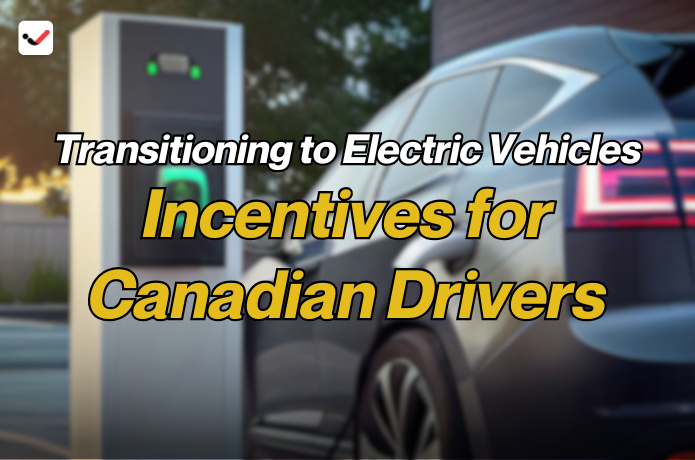Transitioning to Electric Vehicles: Incentives for Canadian Drivers
Transitioning to Electric Vehicles: Incentives for Canadian Drivers

As the world moves towards a greener future, Canada is making significant strides in encouraging the adoption of electric vehicles (EVs). The shift from traditional gasoline-powered cars to electric vehicles is not only beneficial for the environment but also offers Canadians numerous incentives. With rising concerns about climate change, air pollution, and high fuel costs, many Canadian drivers are considering making the switch to EVs. Government incentives, rebates, and policies are making it easier than ever for people to drive cleaner, more energy-efficient vehicles.
In this article, we will explore the various incentives available to Canadian drivers who are considering transitioning to electric vehicles. From financial rebates to tax credits, these benefits are designed to reduce the upfront costs of EVs and make the transition smoother. By understanding the options available, Canadians can make informed decisions and take full advantage of the programs in place to support the shift towards sustainable transportation.
Federal Incentives for Electric Vehicle Purchases
The Canadian federal government offers several incentives for drivers who choose to purchase an electric vehicle. The most well-known program is the Zero-Emission Vehicle (ZEV) Incentive Program. Under this initiative, eligible buyers can receive up to $5,000 in rebates for purchasing a new electric car or plug-in hybrid vehicle. This rebate helps offset the higher upfront cost of electric vehicles, making them more accessible to a wider range of consumers.
In addition to the ZEV Incentive Program, the federal government has also introduced tax credits for electric vehicles, which further reduce the cost of purchasing an EV. These tax credits allow Canadians to claim a portion of the vehicle's cost on their annual income tax returns. As electric vehicles become more affordable, more Canadians are opting for them, contributing to a cleaner environment and reducing their dependence on fossil fuels.
Provincial Incentives and Rebates
In addition to federal incentives, many provinces in Canada also offer their own rebates and incentives for electric vehicle purchases. For example, British Columbia (BC) has one of the most generous programs, offering rebates of up to $3,000 for eligible electric vehicle buyers. BC also provides additional incentives for those purchasing used EVs, helping make electric cars more affordable for a wider range of people.
Quebec is another province that offers significant rebates for EV purchases. The Quebec government provides a rebate of up to $8,000 for new electric vehicles, depending on the make and model. In some cases, Quebec drivers can also benefit from additional incentives for purchasing used electric vehicles. Ontario, while not currently offering provincial incentives, does have charging infrastructure grants that help reduce the costs of installing home charging stations.
Incentives for Charging Equipment
Charging infrastructure is one of the key factors holding some Canadians back from purchasing electric vehicles. To address this, both the federal and provincial governments offer incentives for installing home charging stations. The Zero-Emission Vehicle Infrastructure Program provides funding to homeowners who install EV charging stations at their residences. This program offers rebates of up to $1,000 for the installation of a home charging unit.
Many provinces, such as BC and Quebec, also offer additional rebates for home charging equipment. These incentives help reduce the financial barrier for those who are looking to install charging equipment and ensure that electric vehicles can be charged conveniently at home. By making home charging more affordable, these programs make it easier for Canadians to transition to electric vehicles without worrying about finding public charging stations.
Discounts on Parking and Toll Fees
In addition to direct financial incentives, some provinces and municipalities offer additional perks for electric vehicle owners. These perks can include free or discounted parking, reduced toll fees, and access to high-occupancy vehicle (HOV) lanes. For example, in some cities, EV owners can park for free or at a reduced rate in certain public parking lots. This benefit can be especially valuable in busy urban areas where parking can be expensive and limited.
Some provinces also provide discounts on tolls for electric vehicles, making it more affordable for drivers to travel on toll highways. These benefits not only help make EVs more convenient but also encourage more Canadians to make the switch to electric cars by providing additional cost savings.
Environmental Benefits and Long-Term Savings
Beyond the financial incentives, one of the most compelling reasons to transition to an electric vehicle is the environmental benefit. Electric vehicles produce zero tailpipe emissions, which significantly reduces air pollution and helps fight climate change. By switching to an EV, Canadian drivers can reduce their carbon footprint and contribute to Canada’s efforts to meet its climate targets.
Electric vehicles also offer long-term savings on fuel and maintenance. While the initial purchase price of an EV may be higher, the cost of charging an electric car is significantly lower than filling up a traditional gasoline-powered vehicle. Additionally, EVs have fewer moving parts, which means lower maintenance costs over time. With fewer oil changes, brake replacements, and other routine maintenance requirements, electric vehicle owners can save money on upkeep.
EVs and the Canadian Economy
The transition to electric vehicles also supports the Canadian economy. As the demand for electric vehicles increases, so does the need for skilled workers in the EV industry. This includes roles in manufacturing, research and development, and the installation of charging infrastructure. By investing in electric vehicles, Canada is not only working towards a greener future but also creating new jobs and economic opportunities in the clean energy sector.
Moreover, the expansion of EV infrastructure, including charging stations, helps boost local economies by creating new business opportunities. As more Canadians adopt electric vehicles, the demand for charging stations will increase, leading to job creation and the development of new technologies. This shift towards electric transportation is part of Canada’s broader strategy to reduce greenhouse gas emissions and transition to a sustainable economy.
Supporting the Transition to Electric Vehicles
As the Canadian government continues to roll out new programs and incentives, the adoption of electric vehicles will become even more widespread. The push to reduce greenhouse gas emissions, combined with the increasing availability of EV models and improved battery technology, makes this the perfect time for Canadian drivers to make the switch to electric vehicles.
To support this transition, it is important for Canadians to stay informed about the available incentives and take advantage of them. Whether through federal rebates, provincial incentives, or discounts on parking and tolls, there are plenty of opportunities to reduce the cost of owning an electric vehicle. Additionally, by understanding the long-term savings and environmental benefits of EVs, more drivers will be motivated to make the switch and contribute to a greener future.
The transition to electric vehicles is an essential step in creating a cleaner, more sustainable future for Canada. With various incentives and rebates available at both the federal and provincial levels, Canadian drivers are well-positioned to make the switch to EVs. These incentives help offset the initial cost of purchasing an electric vehicle, while also making it easier to install charging equipment and access additional perks like free parking and reduced toll fees. As more Canadians embrace electric vehicles, they are not only saving money but also contributing to a cleaner environment and a stronger Canadian economy.

